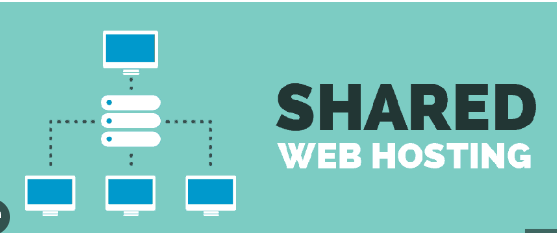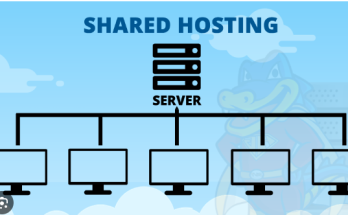In the vast landscape of web hosting options, shared hosting stands out as one of the most popular and cost-effective choices for individuals and small businesses. This article will take you through the intricacies of shared web hosting services, providing a step-by-step guide to help you understand the key aspects, benefits, and potential drawbacks of this hosting solution.
**1. What is Shared Web Hosting?
Shared web hosting involves hosting multiple websites on a single server. Instead of dedicating an entire server to a single website, multiple users share the server’s resources. This cost-effective approach makes shared hosting an excellent choice for those who are just starting their online journey or have moderate website traffic.
**2. Affordability as a Key Advantage
One of the primary advantages of shared hosting is its affordability. By distributing the server costs among multiple users, hosting providers can offer shared plans at significantly lower prices compared to dedicated or VPS hosting. This makes shared hosting an attractive option for budget-conscious individuals and small businesses.
**3. Ease of Setup and Management
Setting up a website on a shared hosting platform is typically straightforward. Most hosting providers offer user-friendly control panels, such as cPanel or Plesk, which simplify the process of managing your website, domains, and email accounts. This ease of use is particularly beneficial for beginners who may not have extensive technical knowledge.
**4. Resource Sharing: Pros and Cons
While cost-sharing is a significant advantage, it comes with the trade-off of shared resources. The server’s CPU, RAM, and bandwidth are distributed among multiple users. This can lead to performance issues if one website experiences a sudden surge in traffic or consumes excessive resources. However, advancements in technology and efficient server management by hosting providers have mitigated many of these concerns.
**5. Scalability and Resource Limits
Shared hosting plans often come with predefined resource limits. While these limits are suitable for many small to medium-sized websites, they may become restrictive as your website grows. If your site experiences increased traffic or resource demands, you might need to consider upgrading to a more robust hosting solution, such as VPS or dedicated hosting.
**6. Security Measures in Shared Hosting
Security is a critical aspect of any web hosting service. In a shared hosting environment, the actions of one user can potentially affect others on the same server. Reputable hosting providers implement security measures, such as firewalls and regular server monitoring, to minimize security risks. Additionally, users are advised to follow best security practices, such as using strong passwords and keeping software up to date.
**7. Customer Support and Reliability
When choosing a shared hosting provider, consider the level of customer support they offer. Reliable customer support is crucial, especially for those who may encounter technical issues or have questions about managing their hosting account. Look for providers that offer 24/7 support through various channels, including live chat, email, and phone.
**8. Backup and Restore Features
Accidents happen, and websites can experience issues or data loss. A reliable shared hosting service should include regular backups and provide users with tools to restore their websites easily. Before choosing a hosting provider, inquire about their backup policies and the frequency of backups.
**9. Addon Services and Extras
Many shared hosting plans come with additional features and services, such as a free domain name, website builders, and one-click installers for popular content management systems (CMS) like WordPress. Evaluate these extras to determine if they align with your website’s needs and save you time and effort in the long run.
**10. Choosing the Right Shared Hosting Provider
In conclusion, shared web hosting services offer an accessible entry point for individuals and businesses looking to establish an online presence. As you explore different providers and plans, consider factors such as affordability, ease of use, security measures, customer support, and scalability. By making an informed decision, you can set the foundation for a successful online venture without breaking the bank.
Understanding Shared Web Hosting Services: A Comprehensive Guide
Introduction:
In the ever-evolving digital landscape, the importance of a reliable web hosting service cannot be overstated. For many website owners, shared web hosting has emerged as a cost-effective and practical solution. In this comprehensive guide, we will delve into the intricacies of shared web hosting services, exploring what they are, how they work, their advantages, potential drawbacks, and key considerations when choosing a provider.
What is Shared Web Hosting?
Shared web hosting is a type of hosting service where multiple websites share resources on a single server. Unlike dedicated hosting, where a server is exclusively dedicated to one website, shared hosting allows numerous websites to coexist on the same server. This sharing of resources, including server space, bandwidth, and computing power, makes shared hosting an affordable option for individuals and small to medium-sized businesses.
How Shared Hosting Works:
In a shared hosting environment, a server is partitioned to host multiple accounts, each associated with a separate website. When a user types a website’s URL into their browser, the server retrieves the requested web page and delivers it to the user’s browser. This process is made possible by the server’s ability to allocate resources dynamically among the shared hosting accounts.
Advantages of Shared Web Hosting:
Cost-Effectiveness: Shared hosting is typically the most budget-friendly option for hosting a website, making it an attractive choice for individuals and small businesses with limited budgets.
Ease of Use: Shared hosting providers often offer user-friendly control panels, simplifying the management of websites, domain names, and email accounts.
Maintenance and Security: Server maintenance and security tasks are handled by the hosting provider, freeing users from the technical aspects of server management.
Scalability: Shared hosting plans are often scalable, allowing users to upgrade their plans as their websites grow in traffic and complexity.
Drawbacks of Shared Hosting:
Limited Resources: Since resources are shared among multiple websites, a sudden surge in traffic to one site could potentially impact the performance of others on the same server.
Security Concerns: While hosting providers implement security measures, the shared nature of the server means that a security breach in one account could pose a risk to others.
Customization Limitations: Shared hosting may have limitations on customizing server configurations, which could be a drawback for advanced users with specific technical requirements.
Choosing the Right Shared Hosting Provider:
Performance and Uptime: Evaluate the hosting provider’s track record in terms of server performance and uptime. Look for providers that offer a high percentage of uptime and optimal server response times.
Customer Support: Consider the quality and responsiveness of customer support. A reliable support team can be crucial in resolving issues promptly and ensuring smooth website operation.
Scalability Options: Assess the scalability options provided by the hosting provider. A good shared hosting plan should allow for easy upgrades as your website grows.
Security Measures: Inquire about the security measures in place, such as firewalls, malware scanning, and backup protocols. A secure hosting environment is vital for protecting your website and data.
User Reviews and Recommendations: Read user reviews and seek recommendations from trusted sources to gauge the experiences of other users with a particular hosting provider.



